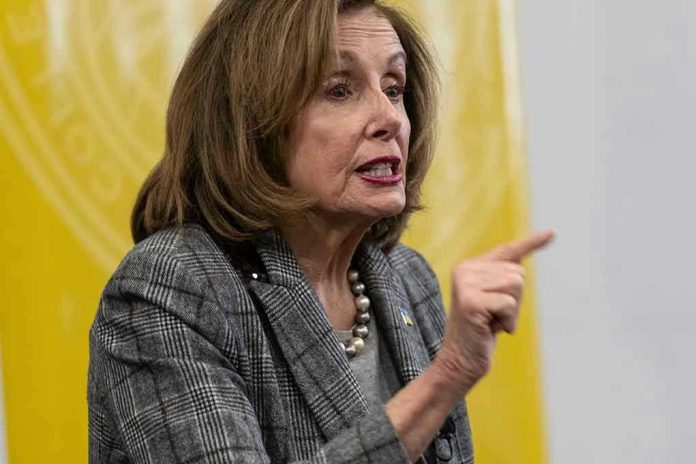
When a seasoned political figure like Nancy Pelosi faces real-time corrections from a network like CNN, it raises questions about the state of political communication and media accountability.
Story Snapshot
- Nancy Pelosi allegedly made inaccurate statements during a CNN interview.
- CNN anchors corrected her multiple times in real-time.
- The incident highlights Pelosi’s vulnerabilities and CNN’s commitment to fact-checking.
- The story reflects broader media scrutiny in today’s polarized environment.
Pelosi’s Interview Sparks Controversy
Nancy Pelosi, the former Speaker of the House, recently found herself at the center of a media storm. During a CNN interview, she allegedly made a series of confusing or inaccurate statements, prompting the network’s anchors to intervene with real-time corrections. This incident is particularly significant because CNN, often perceived as left-leaning, stepped in to fact-check one of the most prominent Democratic figures, suggesting the severity of the misstatements.
Bumbling Nancy Pelosi Goes So Off the Rails, Even CNN Has to Correct Her Multiple Times https://t.co/YBGeJf3VZW
— Team CRUSH ✝️ 🇺🇸 (@NorCalCrush) October 8, 2025
The event has been framed as a portrayal of Pelosi being “off the rails,” implying a loss of composure and credibility. Such characterizations are not uncommon, given the highly polarized media landscape where political interviews are scrutinized for factual accuracy. The fact that CNN intervened highlights the network’s commitment to journalistic standards, regardless of political affiliation.
Context and Background
Nancy Pelosi’s public statements have long been a subject of intense scrutiny. As a leading figure in U.S. politics, her words carry significant weight and are often analyzed by fact-checking organizations. The practice of real-time fact-checking has become more prevalent in recent years, reflecting a broader demand for accountability in political discourse.
The CNN interview fits into a recurring pattern where Pelosi’s statements are examined for accuracy. While her record includes statements rated as “True,” “Half True,” and “False” by fact-checkers, this particular incident stands out due to the immediate corrections by a mainstream media outlet during the interview itself.
Implications for Political Communication
The short-term implications of this story are clear: it can affect public perceptions of Pelosi’s credibility and competence. In the long-term, persistent scrutiny could influence her legacy and the discourse surrounding political accountability. This incident also underscores the evolving role of media outlets like CNN in holding public figures accountable, even those aligned with their perceived ideological leanings.
The corrections by CNN may fuel partisan narratives, deepening existing political divides. However, they also reinforce the importance of media literacy and the need for the public to critically engage with news content. In a time when misinformation can spread rapidly, the role of fact-checkers and credible media outlets is more crucial than ever.
Expert Perspectives and Analysis
Media analysts emphasize that while real-time fact-checking is essential, the way corrections are framed can be weaponized in partisan contexts. Some experts argue that such corrections demonstrate media accountability, while others view them as opportunities for political opponents to attack.
Scholars advocate for heightened media literacy, encouraging audiences to critically evaluate news sources and understand the potential biases inherent in coverage. The transparency of organizations like PolitiFact, which provides comprehensive evaluations of political statements, is vital in maintaining public trust in fact-checking processes.
Sources:
PolitiFact – Nancy Pelosi Fact Checks
PolitiFact – Target: Nancy Pelosi









